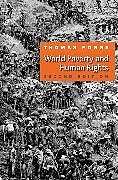World Poverty and Human Rights
Einband:
Kartonierter Einband
EAN:
9780745641447
Untertitel:
2nd Edition
Genre:
Politikwissenschaft
Autor:
Pogge Thomas W.
Herausgeber:
Polity Press
Auflage:
2. Auflage
Anzahl Seiten:
304
Erscheinungsdatum:
18.12.2007
ISBN:
978-0-7456-4144-7
Some 2. 5 billion human beings live in severe poverty, deprived of such essentials as adequate nutrition, safe drinking water, basic sanitation, adequate shelter, literacy, and basic health care. One third of all human deaths are from poverty-related causes: 18 million annually, including over 10 million children under five.
Autorentext
Thomas Pogge is Professor of Philosophy and International Affairs at Yale University, Professorial Fellow in the Centre for Applied Philosophy and Public Ethics at the Australian National University, Research Director in the Centre for the Study of Mind in Nature at the University of Oslo, and Adjunct Professor in the Centre for Professional Ethics at the University of Central Lancashire.
Inhalt
Introduction. I Some Cautions About Our Moral Judgements. II Four Easy Reasons to Ignore World Poverty. III Sophisticated Defenses of our acquiescence in world poverty. IV Does Our New Global Economic Order Really Not Harm the Poor?. V Responsibilities and Reforms. Chapter 1: Human Flourishing and Universal Justice. 1. 0 Introduction. 1. 1 Social Justice. 1. 2 Paternalism. 1. 3 Justice in First Approximation. 1. 4 Essential Refinements. 1. 5 Human Rights. 1. 6 Specification of Human Rights and Responsibilities for their Realization. 1. 7 Conclusion. Chapter 2: How Should Human Rights be Conceived?. 2. 0 Introduction. 2. 1 From Natural Law to Rights. 2. 2 From Natural Rights to Human Rights. 2. 3 Official Disrespect. 2. 4 The Libertarian Critique of Social and Economic Rights. 2. 5 The Critique of Social and Economic Rights as 'Manifesto Rights'. 2. 6 Disputes about Kinds of Human Rights. Chapter 3: Loopholes in Moralities. 3. 0 Introduction. 3. 1 Types of Incentives. 3. 2 Loopholes. 3. 3 Social Arrangements. 3. 4 Case 1: The Converted Apartment Building. 3. 5 Case 2: The Homelands Policy of White South Africa. 3. 6 An Objection. 3. 7 Strengthening. 3. 8 Fictional Histories. 3. 9 Puzzles of Equivalence. 3. 10 Conclusion. Chapter 4: Moral Universalism and Global Economic Justice. 4. 0 Introduction. 4. 1 Moral Universalism. 4. 2 Our Moral Assessment of National and Global Economic Orders. 4. 3 Some Factual Background about the Global Economic Order. 4. 3. 1 The Extent of World Poverty. 4. 3. 2 The Extent of Global Inequality. 4. 3. 3 Trends in World Poverty and Inequality. 4. 4 Conceptions of National and Global Economic Justice Contrasted. 4. 5 Moral Universalism and David Miller's Contextualism. 4. 6 Contextualist Moral Universalism and John Rawls's Moral Conception. 4. 7 Rationalizing Divergent Moral Conceptions Through a Double Standard. 4. 8 Rationalizing Divergent Moral Conceptions Without a Double Standard. 4. 9 The Causal Role of Global Institutions in the Persistence of Severe Poverty. 4. 10 Conclusion. Chapter 5: The Bounds of Nationalism. 5. 0 Introduction. 5. 1 Common Nationalism - Priority for the Interests of Compatriots. 5. 2 Lofty Nationalism - The Justice-for-Compatriots Priority. 5. 3 Explanatory Nationalism - The Deep Significance of National Borders. 5. 4 Conclusion. Chapter 6: Achieving Democracy. 6. 0 Introduction. 6. 1 The Structure of the Problem Faced by Fledgling Democracies. 6. 2 Reducing the Expected Rewards of Coups d'Etat. 6. 3 Undermining the Borrowing Privilege of Authoritarian Predators. 6. 3. 1 The Criterial Problem. 6. 3. 2 The Tit-For-Tat Problem. 6. 3. 3 The Establishment Problem. 6. 3. 4 Synthesis. 6. 4 Undermining the Resource Privilege of Authoritarian Predators. 6. 5 Conclusion. Chapter 7: Cosmopolitanism and Sovereignty. 7. 0 Introduction. 7. 1 Institutional Cosmopolitanism Based on Human Rights. 7. 2 The Idea of State Sovereignty. 7. 3 Some Main Reasons for a Vertical Dispersal of Sovereignty. 7. 3. 1 Peace and Security. 7. 3. 2 Reducing Oppression. 7. 3. 3 Global Economic Justice. 7. 3. 4 Ecology/Democracy. 7. 4 The Shaping and Reshaping of Political Units. 7. 5 Conclusion. Chapter 8: Eradicating Systemic Poverty: Brief for a Global Resources Dividend. 8. 0 Introduction. 8. 1 Radical Inequality and Our Responsibility. 8. 2 Three Grounds of Injustice. 8. 2. 1 The Effects of Shared Social Institutions. 8. 2. 2 Uncompensated Exclusion from the Use of Natural Resources. 8. 2. 3 The Effects of a Common and Violent History. 8. 3 A Moderate Proposal. 8. 4 The Moral Argument for the Proposed Reform. 8. 5 Is the Reform Proposal Realistic?. 8. 6 Conclusion. Chapter 9: Pharmaceutical Innovation: Must We Exclude the Poor? . 9.0 Introduction. 9.1 The TRIPS Agreement and its aftermath. 9.2 The argument from beneficial consequences. 9.3 Toward a better way of stimulating research and development of essential medicines. 9.4 Differential pricing. 9.5 The public-good strategy for extending access to essential medicines. 9.6 A full-pull plan for the provision of pharmaceuticals. 9.7 Specifying and implementing the basic full-pull idea. 9.8 Justifying the plan to affluent citizens and their representatives. Last Words. Notes. Bibliography. Index

Leider konnten wir für diesen Artikel keine Preise ermitteln ...
billigbuch.ch sucht jetzt für Sie die besten Angebote ...
Die aktuellen Verkaufspreise von 6 Onlineshops werden in Realtime abgefragt.
Sie können das gewünschte Produkt anschliessend direkt beim Anbieter Ihrer Wahl bestellen.
Loading...
Die aktuellen Verkaufspreise von 6 Onlineshops werden in Realtime abgefragt.
Sie können das gewünschte Produkt anschliessend direkt beim Anbieter Ihrer Wahl bestellen.
| # | Onlineshop | Preis CHF | Versand CHF | Total CHF | ||
|---|---|---|---|---|---|---|
| 1 | Seller | 0.00 | 0.00 | 0.00 |
